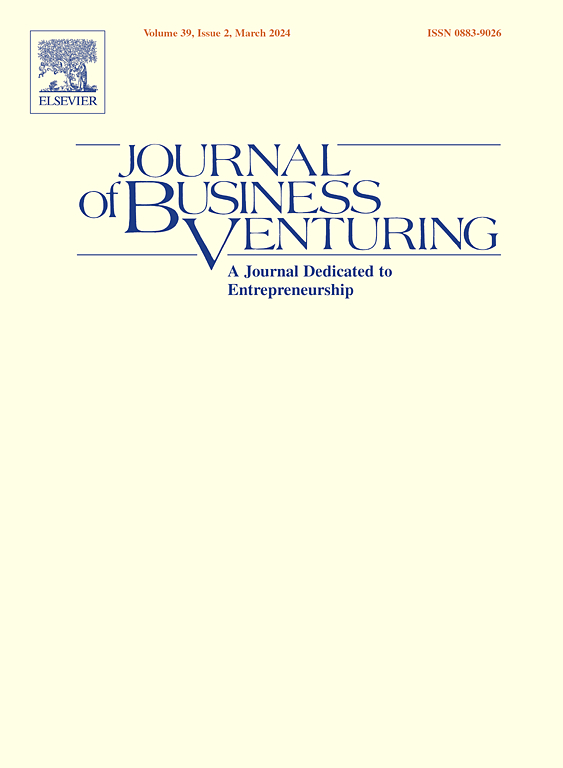大胆,广泛,严谨,并且…相关?为翻译设计创业研究
IF 8.9
1区 管理学
Q1 BUSINESS
引用次数: 0
摘要
创业研究应该力求相关性——影响那些实践创业的人的思想、决策和行动的潜力。尽管《商业创业杂志》(JBV)努力培养相关性,但提交的文章往往无法证明其实际用途的潜力。要解决这一问题,需要将实践相关性作为研究设计的指导原则,以补充JBV出版的传统学术标准。它还包括放弃让研究直接供从业者使用的尝试,这些从业者很少阅读像JBV这样的学术期刊,而是倾向于提高其在针对这些受众的翻译渠道中的适用性。我们引入了三个设计标准——重要性、洞察力和影响力——来指导遵循传统学术标准的可翻译研究的创作。我们的讨论涉及设计标准的含义,它们如何使研究可翻译,学者如何满足这些标准,它们在范例JBV出版物中是什么样子,以及为什么它们现在很重要。的确,设计具有现实重要性、洞察力和影响力的研究,可能会产生更适合在学术界之外传播的学术贡献,使创业研究定位于实践相关性。本文章由计算机程序翻译,如有差异,请以英文原文为准。
Bold, broad, rigorous, and…relevant? Designing entrepreneurship research for translation
Entrepreneurship research should strive for relevance—the potential to influence the thoughts, decisions, and actions of those who practice entrepreneurship. Despite the Journal of Business Venturing’s (JBV) efforts to foster relevance, submissions often fail to demonstrate their potential for practical usefulness. Addressing this problem involves making practical relevance a guiding principle of research design that complements traditional academic standards for publishing in JBV. It also involves forgoing attempts to make research directly usable by practitioners, who rarely read scholarly journals like JBV, in favor of enhancing its suitability for translation in outlets intended for those audiences. We introduce three design criteria—importance, insight, and impact—to guide the creation of translatable research that honors traditional academic standards. Our discussion touches on what the design criteria mean, how they make research translatable, how scholars can satisfy them, what they look like in exemplar JBV publications, and why they matter now. Indeed, designing research with practical importance, insight, and impact in mind may yield academic contributions more suitable for dissemination beyond academic circles, positioning entrepreneurship research to achieve practical relevance.
求助全文
通过发布文献求助,成功后即可免费获取论文全文。
去求助
来源期刊

Journal of Business Venturing
BUSINESS-
CiteScore
16.70
自引率
6.90%
发文量
59
审稿时长
77 days
期刊介绍:
The Journal of Business Venturing: Entrepreneurship, Entrepreneurial Finance, Innovation and Regional Development serves as a scholarly platform for the exchange of valuable insights, theories, narratives, and interpretations related to entrepreneurship and its implications.
With a focus on enriching the understanding of entrepreneurship in its various manifestations, the journal seeks to publish papers that (1) draw from the experiences of entrepreneurs, innovators, and their ecosystem; and (2) tackle issues relevant to scholars, educators, facilitators, and practitioners involved in entrepreneurship.
Embracing diversity in approach, methodology, and disciplinary perspective, the journal encourages contributions that contribute to the advancement of knowledge in entrepreneurship and its associated domains.
 求助内容:
求助内容: 应助结果提醒方式:
应助结果提醒方式:


